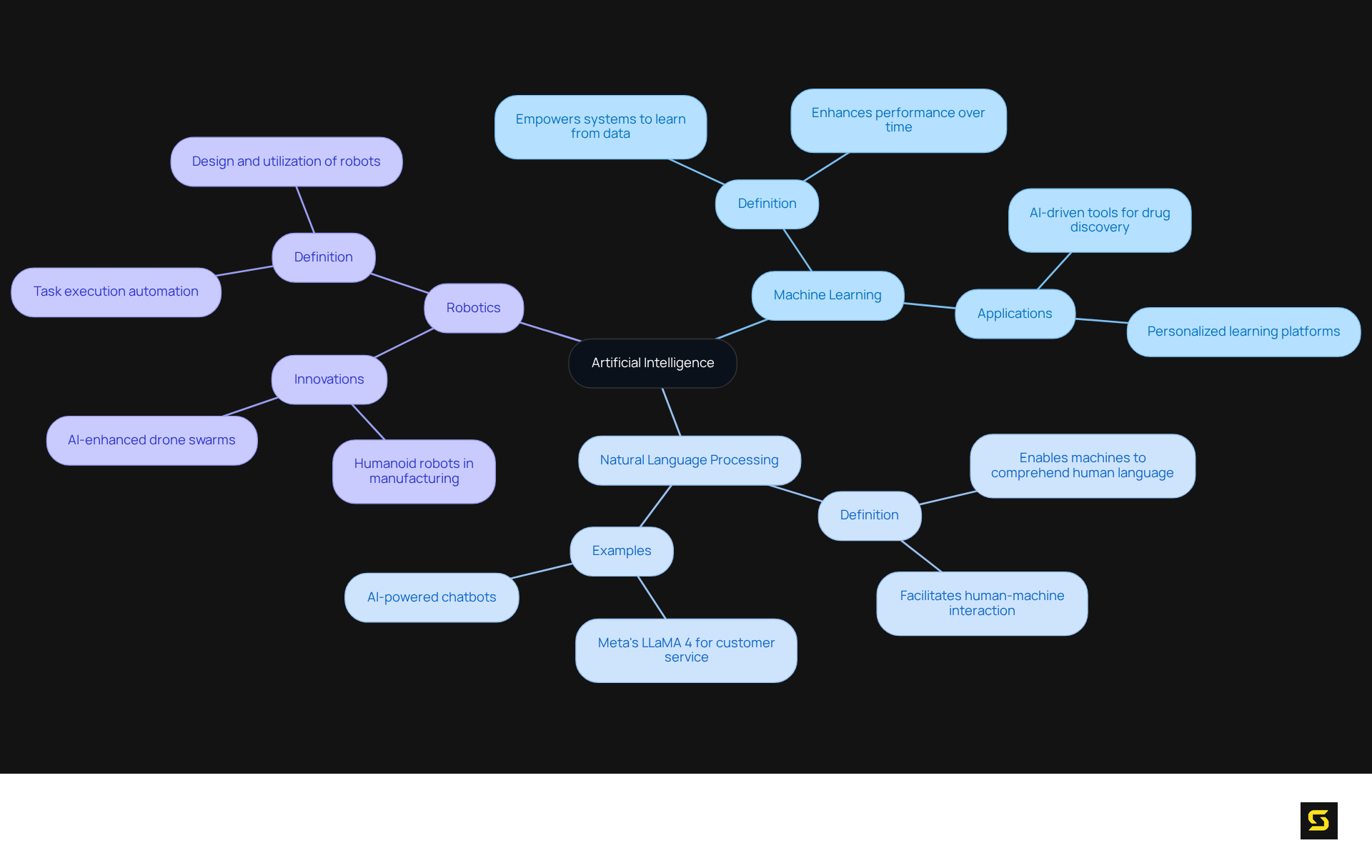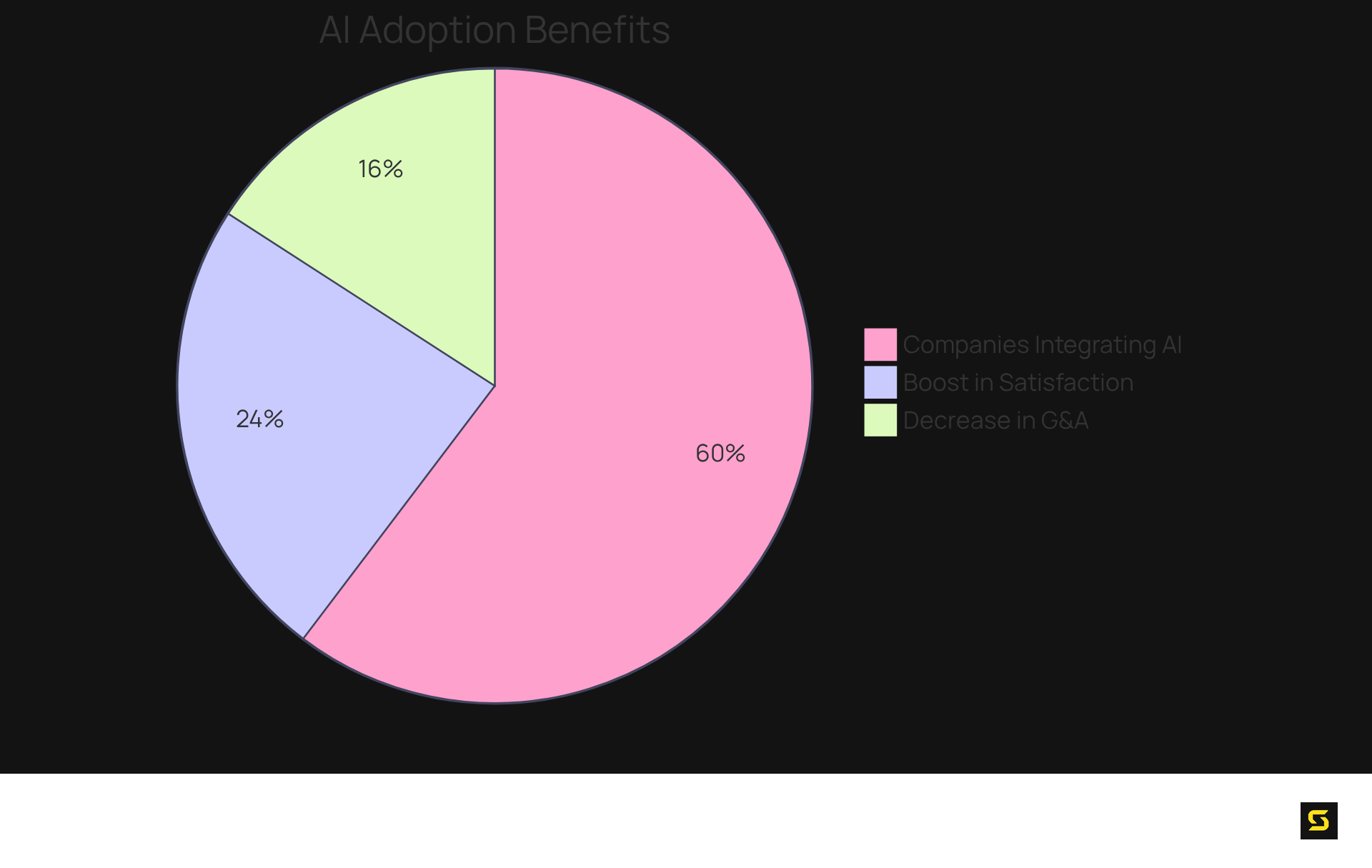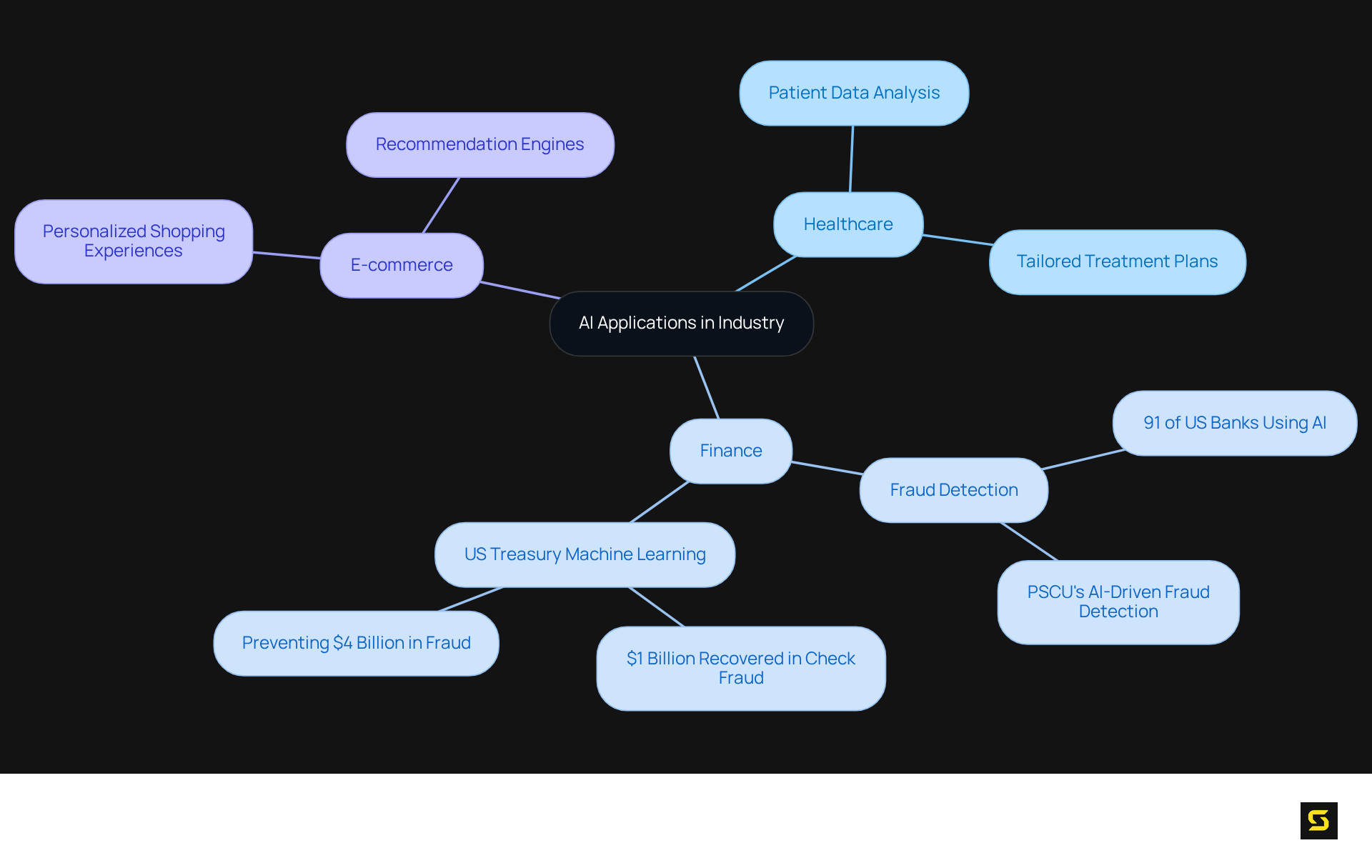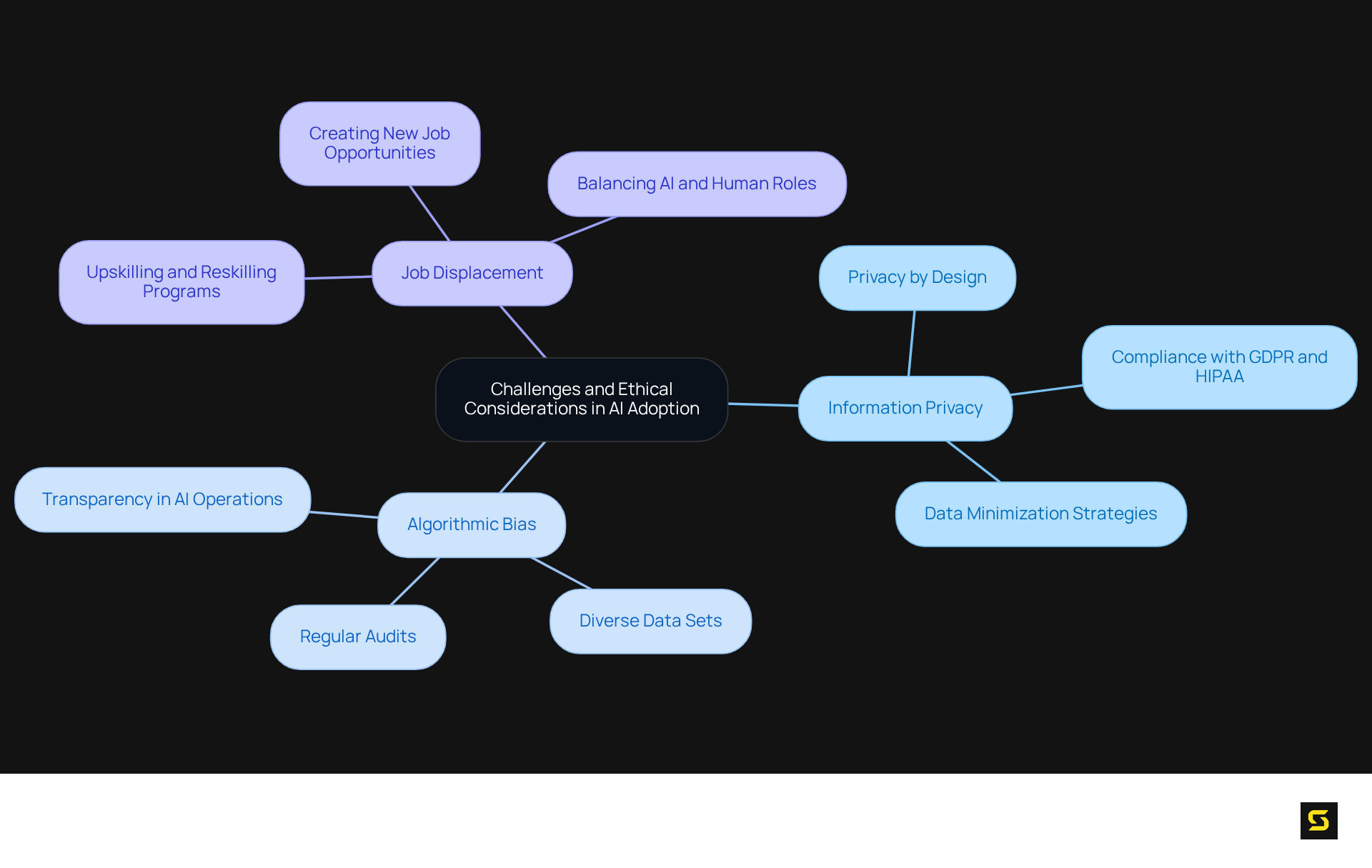Overview
AI offers significant advantages for SaaS product owners, including enhanced operational efficiency, improved customer service, and a competitive edge through data-driven insights. This article highlights how AI applications—such as analytics tools and chatbots—effectively reduce costs and increase customer satisfaction.
Furthermore, it underscores the critical role of ethical considerations in AI adoption, which is essential for fostering user trust and ensuring compliance.
Embrace AI to not only optimize your operations but also to elevate your customer experience and maintain a trustworthy relationship with your users.
Introduction
Artificial Intelligence (AI) has transcended the realm of futuristic concepts; it stands as a cornerstone of innovation across industries, particularly for Software as a Service (SaaS) product owners. By harnessing the power of AI, these leaders unlock a plethora of benefits, enhancing operational efficiency and revolutionizing customer experiences.
As the landscape evolves, however, pressing questions emerge:
- How can SaaS product owners effectively integrate AI into their offerings while navigating the ethical challenges and complexities that accompany this technology?
- Exploring these dynamics not only reveals the transformative potential of AI but also highlights the critical considerations that must be addressed to thrive in a competitive market.
Define Artificial Intelligence and Its Core Concepts
Artificial Intelligence (AI) embodies the simulation of human intelligence processes by machines, particularly computer systems. Core concepts of AI encompass:
- Machine learning
- Natural language processing
- Robotics
Machine learning empowers systems to learn from data and enhance performance over time without explicit programming. Natural language processing enables machines to comprehend and respond to human language, while robotics pertains to the design and utilization of robots for task execution. Understanding these concepts is paramount for software-as-a-service product owners as they consider the benefits of AI in augmenting their offerings and elevating user experiences.
Recent advancements in AI, such as the [emergence of AI-driven tools for drug discovery](https://morganstanley.com/insights/articles/ai-trends-reasoning-frontier-models-2025-tmt) and personalized learning platforms, showcase the benefits of AI and its transformative potential across various sectors. For instance, the global AI market is projected to escalate from $189 billion in 2023 to $4.8 trillion by 2033, underscoring the increasing significance of AI in the SaaS industry. Additionally, Chris Young from Microsoft remarked on the benefits of AI, noting that it is already rendering the impossible achievable and highlighting its transformative potential. With among business leaders rising from 55% to 75% in the past year, grasping AI's capabilities and applications is essential for maintaining competitiveness in the swiftly evolving digital landscape.

Explore Key Benefits of AI in Business Operations
The benefits of AI include significantly enhancing business operations by driving efficiency, optimizing information analysis, and elevating customer service. AI-driven analytics tools swiftly process vast datasets, yielding actionable insights that guide strategic decision-making. Firms employing AI for analysis report a 20% decrease in General and Administrative expenses compared to those that do not. Furthermore, AI chatbots provide 24/7 customer support, drastically improving response times and boosting customer satisfaction rates by up to 30%. Notably, 76% of private software companies are integrating AI into their offerings, underscoring the extensive adoption of AI within the sector. Organizations that integrate AI into their operations not only achieve substantial cost savings but also realize the benefits of AI in gaining a competitive edge in their respective markets. Therefore, adopting AI is essential for software service creators aiming to and meet evolving client expectations.

Examine Industry-Specific Applications of AI
The benefits of AI are evident as applications revolutionize industries by significantly enhancing operational efficiency and user experiences. In healthcare, the benefits of AI include meticulously analyzing extensive patient data to predict health outcomes and tailor treatment plans, thereby markedly improving patient care. In the finance sector, the benefits of AI are significant as AI systems play a pivotal role in detecting fraudulent transactions in real-time, with an impressive 91% of US banks currently utilizing AI for this purpose. This statistic underscores the technology's critical role in . A notable example is the US Treasury Department's implementation of machine learning AI, which has resulted in the recovery of $1 billion in check fraud during fiscal 2024—nearly tripling the previous year's recovery. This showcases the technology's effectiveness in safeguarding taxpayer money.
Furthermore, possible fraud losses for financial services organizations in the United States could reach $40 billion by 2027, highlighting the urgent need for software developers to integrate AI solutions, which emphasize the benefits of AI for fraud detection. E-commerce platforms are leveraging AI to highlight the benefits of AI by providing personalized shopping experiences through advanced recommendation engines, driving user engagement and satisfaction. A striking illustration of this is PSCU's AI-driven fraud detection, which saved approximately $35 million in fraud and reduced response time by an astonishing 99%.
By identifying these industry-specific applications and the challenges faced by traditional fraud detection systems, software solution developers can uncover opportunities to incorporate the benefits of AI into their services, thereby enhancing functionality and fostering stronger relationships with users.

Analyze Challenges and Ethical Considerations in AI Adoption
The adoption of AI presents substantial advantages, showcasing the benefits of AI; however, it also brings forth a myriad of challenges and ethical considerations that must be navigated with precision. Key issues include:
- Information privacy
- Algorithmic bias
- The risk of job displacement
All of which require proactive management. SaaS solution managers are tasked with ensuring their AI systems adhere to stringent privacy protection regulations, such as GDPR and HIPAA, to mitigate risks associated with breaches and privacy violations. Organizations must adopt a 'privacy by design' approach as GDPR-like regulations proliferate globally, underscoring the critical importance of privacy in AI implementation. Moreover, it is essential to create AI solutions that reduce bias in decision-making processes, particularly as 59% of individuals express concerns regarding the reliability of AI in sensitive fields like healthcare.
Transparency in AI operations emerges as another crucial element that can . By articulating how AI systems function and the data they utilize, developers can alleviate apprehensions related to algorithmic bias and data misuse. Notably, 81% of employees report enhanced performance when AI is thoughtfully integrated into workflows, demonstrating the benefits of AI in boosting productivity when ethical considerations are prioritized.
To adeptly navigate these challenges, SaaS solution managers should implement robust governance frameworks that incorporate regular audits of AI systems for bias and compliance. Engaging cross-functional teams in the development process ensures diverse perspectives are acknowledged, ultimately leading to more equitable AI solutions. As Jonathan Kleiman aptly states, "Those that master these fundamentals will turn AI into a true competitive advantage." By confronting these ethical considerations directly, product owners can develop AI applications that are not only innovative but also responsible and aligned with societal values.

Conclusion
Embracing the transformative power of Artificial Intelligence is not merely advantageous; it is essential for SaaS product owners who aspire to elevate their offerings and meet the evolving demands of users. The integration of AI streamlines operations and provides substantial benefits in enhancing customer service, driving efficiency, and maintaining a competitive edge in a rapidly changing digital landscape.
This article underscores several compelling arguments regarding the benefits of AI, including its capability to:
- Optimize business processes
- Enhance decision-making through data analysis
- Personalize user experiences across diverse industries
From healthcare to finance, the applications of AI are extensive and impactful, demonstrating its critical role in improving operational efficiency and user satisfaction. Moreover, the ethical considerations and challenges surrounding AI adoption—such as privacy concerns and algorithmic bias—highlight the necessity for responsible implementation to foster trust and accountability.
As the AI market continues to expand, it is imperative for SaaS product owners to not only adopt these technologies but also to do so with a steadfast commitment to ethical practices and user transparency. By leveraging AI effectively and responsibly, businesses can drive innovation while creating solutions that resonate with societal values and expectations. The future of SaaS hinges on the strategic integration of AI; those who embrace this shift will undoubtedly position themselves for success in an increasingly competitive marketplace.
Frequently Asked Questions
What is Artificial Intelligence (AI)?
Artificial Intelligence (AI) is the simulation of human intelligence processes by machines, particularly computer systems.
What are the core concepts of AI?
The core concepts of AI include machine learning, natural language processing, and robotics.
What is machine learning?
Machine learning is a subset of AI that enables systems to learn from data and improve their performance over time without being explicitly programmed.
How does natural language processing work?
Natural language processing allows machines to understand and respond to human language.
What does robotics refer to in the context of AI?
Robotics pertains to the design and utilization of robots for executing tasks.
Why is understanding AI concepts important for software-as-a-service (SaaS) product owners?
Understanding AI concepts is important for SaaS product owners as it helps them consider the benefits of AI in enhancing their offerings and improving user experiences.
What are some recent advancements in AI?
Recent advancements in AI include AI-driven tools for drug discovery and personalized learning platforms.
What is the projected growth of the global AI market?
The global AI market is projected to grow from $189 billion in 2023 to $4.8 trillion by 2033.
What did Chris Young from Microsoft say about AI?
Chris Young noted that AI is already making the impossible achievable and highlighted its transformative potential.
How has the usage of generative AI changed among business leaders recently?
The usage of generative AI among business leaders has increased from 55% to 75% in the past year.





